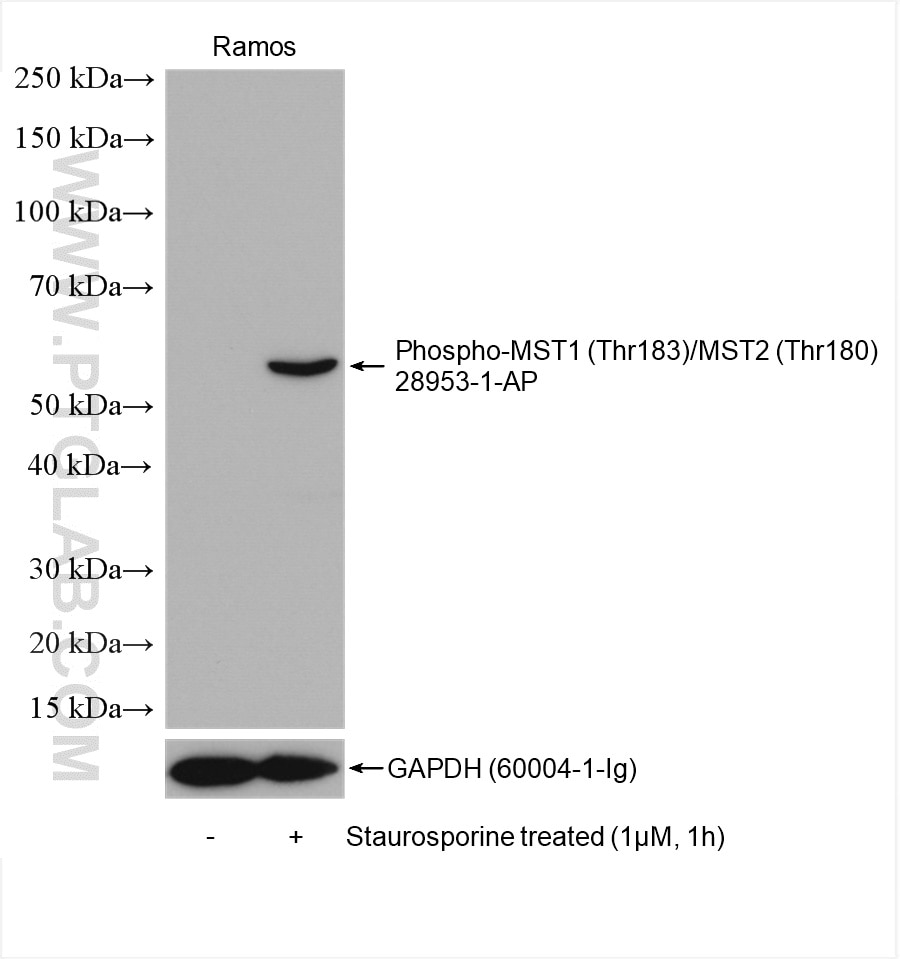Tested Applications
| Positive WB detected in | Staurosporine treated Ramos cells |
Recommended dilution
| Application | Dilution |
|---|---|
| Western Blot (WB) | WB : 1:500-1:2000 |
| It is recommended that this reagent should be titrated in each testing system to obtain optimal results. | |
| Sample-dependent, Check data in validation data gallery. | |
Published Applications
| WB | See 7 publications below |
Product Information
28953-1-AP targets Phospho-MST1 (Thr183)/MST2 (Thr180) in WB, ELISA applications and shows reactivity with Human samples.
| Tested Reactivity | Human |
| Cited Reactivity | human, mouse, rat |
| Host / Isotype | Rabbit / IgG |
| Class | Polyclonal |
| Type | Antibody |
| Immunogen |
Peptide Predict reactive species |
| Full Name | serine/threonine kinase 4 |
| Calculated Molecular Weight | 56 kDa |
| Observed Molecular Weight | 52-56 kDa |
| GenBank Accession Number | BC005231 |
| Gene Symbol | MST1 |
| Gene ID (NCBI) | 6789 |
| RRID | AB_2918221 |
| Conjugate | Unconjugated |
| Form | Liquid |
| Purification Method | Antigen affinity purification |
| UNIPROT ID | Q13043 |
| Storage Buffer | PBS with 0.02% sodium azide and 50% glycerol, pH 7.3. |
| Storage Conditions | Store at -20°C. Stable for one year after shipment. Aliquoting is unnecessary for -20oC storage. 20ul sizes contain 0.1% BSA. |
Background Information
Mammalian STE20-like serine-threonine kinase MST1, encoded by the STK4 gene, is a multifunctional protein. MST1 and its closest paralogs MST2 (encoded by the STK3 gene), MST3, and MST4 are members of the Class II Germinal Center Family of Protein Kinases. MST1/2 and LATS1/2 (large tumor suppressor 1 and 2) are core kinase components of the Hippo tumor suppressor pathway in mammalians . In the conventional Hippo pathway, the MST1/2 and LATS1/2 signaling cascade phosphorylates and inactivates the transcriptional coactivator YAP1 (yes associated protein 1) and its close paralog WWTR1]. YAP1 and WWTR1 do not have DNA binding domains and they exert their biological outputs, such as cell proliferation and survival, by interacting with the TEAD1-4 transcription factors. Lines of evidence have indicated that dysregulation or loss of STK4/Hippo signaling is linked to developmental disorders and carcinogenesis with poor prognosis. MST1 is a stress-induced kinase and it can be activated in response to cell-death inducers. Autophosphorylation of MST1 at Thr183 (Thr180 in MST2) in the activation loop is a key activation mechanism for MST1/2 because phosphorylation of Thr183/180 causes the cleavage of MST1 by caspases under apoptotic conditions.
Protocols
| Product Specific Protocols | |
|---|---|
| WB protocol for Phospho-MST1 (Thr183)/MST2 (Thr180) antibody 28953-1-AP | Download protocol |
| Standard Protocols | |
|---|---|
| Click here to view our Standard Protocols |
Publications
| Species | Application | Title |
|---|---|---|
Int J Biol Sci S100 Calcium Binding Protein A16 Promotes Cell Proliferation by triggering LATS1 ubiquitin degradation mediated by CUL4A ligase to inhibit Hippo pathway in Glioma development | ||
Cell Rep The STRIPAK complex is required for radial sorting and laminin receptor expression in Schwann cells | ||
bioRxiv The STRIPAK complex is required for radial sorting and laminin receptor expression in Schwann cells | ||
Discov Oncol Upregulated GPRC5A disrupting the Hippo pathway promotes the proliferation and migration of pancreatic cancer cells via the cAMP-CREB axis | ||
Cell Death Dis PLAGL2 promotes bladder cancer progression via RACGAP1/RhoA GTPase/YAP1 signaling | ||




